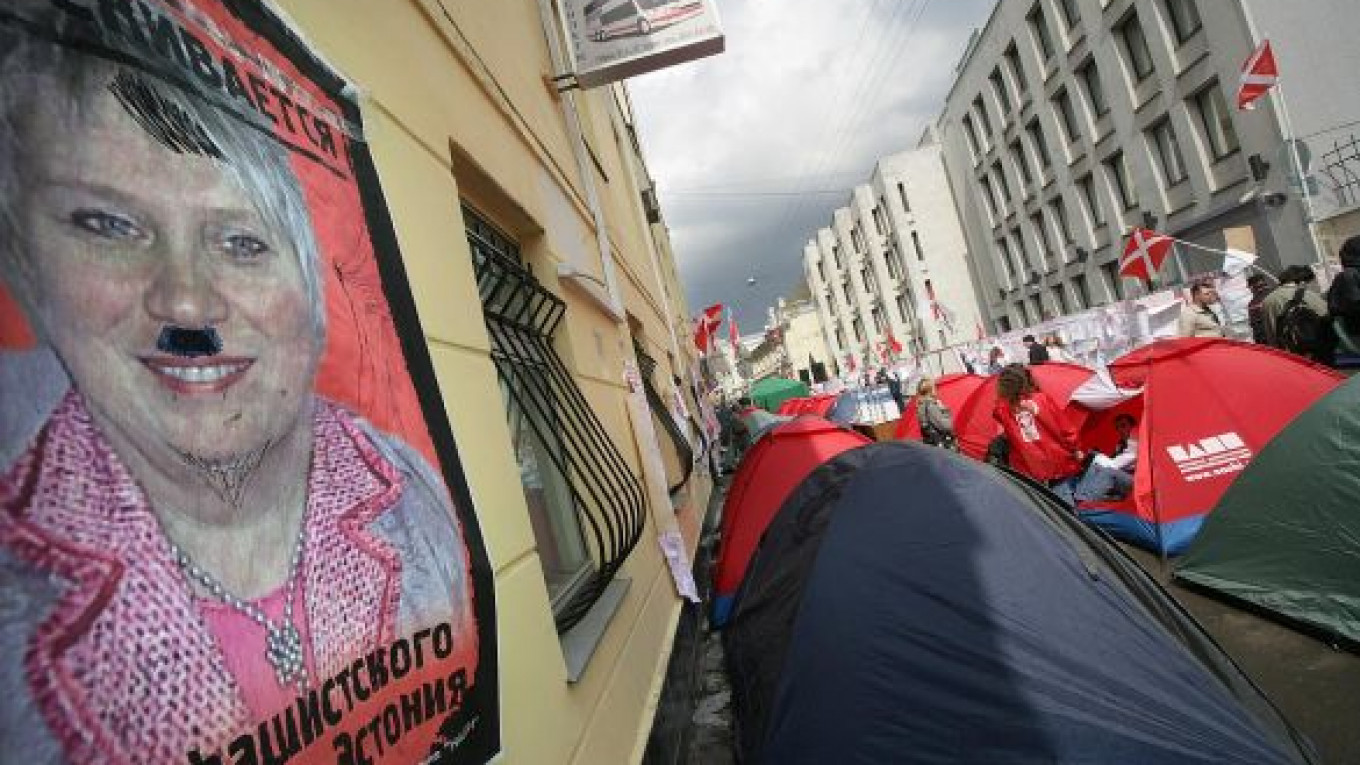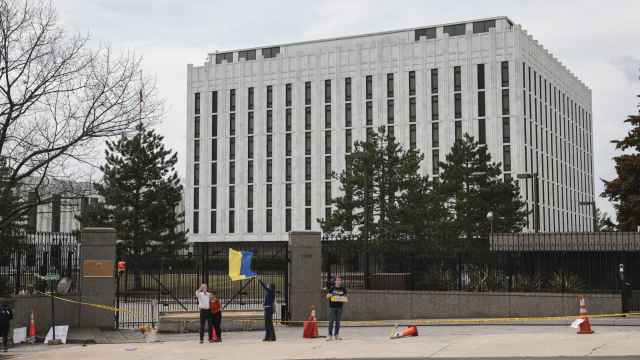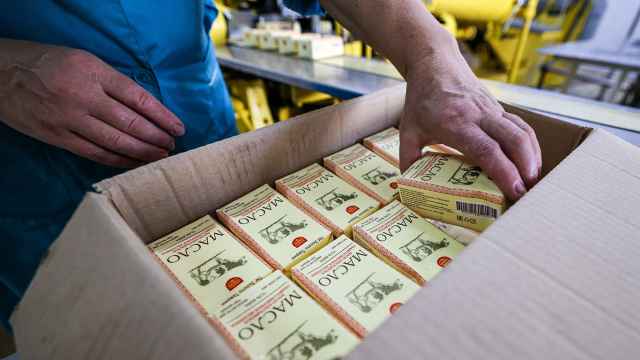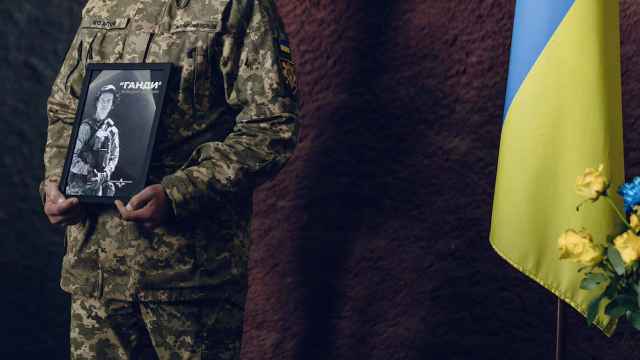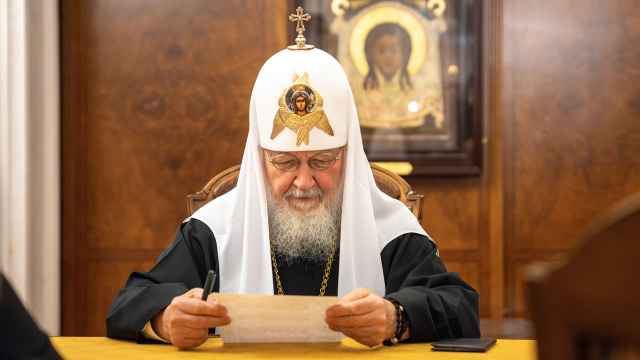Nashi, the controversial pro-Kremlin youth group known for fierce campaigns against government critics at home and abroad, will be split into several projects under a new name, the All-Russian Youth Society, the Izvestia daily newspaper reported on Monday.
A spokeswoman for Nashi appeared to confirm the report, saying the name "Nashi" (Ours) would remain, for now, but that the "logic would change" and the group would expand geographically and widen the scope of its activities, Interfax reported.
Analysts downplayed the report, saying the Kremlin would continue to use such groups to recruit and groom sympathetic young people and as a counterbalance to opposition forces, which have gained an especially strong foothold on online social networks.
"I don't think what's going on right now is a sensation of any kind, but simply a continuation of a trend," said Pavel Salin, an independent political analyst.
Officials within the reportedly embattled youth group, which years ago lost its major political patrons, shrugged off the latest suggestions that Nashi would be closed.
Nashi was effectively broken up into projects after a meeting with Kremlin spindoctor Vyacheslav Volodin last month, Izvestia reported, citing an undisclosed source in the presidential administration.
Each project aims to combat a different perceived social ill: Stopkham (Stop Boorishness) activists target poor behavior on the nation's roads, Khryushi Protiv (Piglets Against) goes after expired produce on grocery store shelves, and Begi Za Mnoi (Run After Me) promotes healthy lifestyles, to name a few existing projects.
Nashi was founded in 2005 as a Kremlin response to youth organizations in Serbia and Georgia that took an active role in anti-authoritarian revolutions seen in Moscow as Western-backed. "For many years, my task was to prevent an Orange Revolution," Nashi creator and former leader Vasily Yakemenko told The Moscow Times last year.
Activists took up pro-Kremlin causes with sometimes alarming relish. Nashi camped outside the Estonian consulate in Moscow during a spat between Russia and Estonia in 2007, prompting the Baltic state to close the consulate for "security" reasons and declare Yakemenko persona non grata.
While the group was officially "anti-fascist" and "democratic," some accused it of bullying government critics, as in 2010, when members of Nashi's radical wing, Stal (Steel), displayed portraits of opposition leaders' heads mounted on stakes and sporting hats with swastikas.
Such tactics led opposition-minded Russians to dub Nashi activists "Nashisty," a nickname that evokes the Russian word for "fascists."
Regardless of Nashi's fate, such groups would continue to have an important role, uniting pro-government young people with political ambitions, said Vyacheslav Nikonov, a State Duma deputy and member of the ruling United Russia party.
"There are hundreds of such organizations. Something is constantly happening to them. They grow and shrink, appear and disappear," he said.
Vladimir Pribylovsky, an analyst with the Panorama think tank, said Nashi no longer had powerful backers in the government. Yakemenko left the Federal Agency for Youth Affairs in June, and the Kremlin's longtime political mastermind, Vladislav Surkov, lost his post in late 2011.
"Nashi was a pet project of Yakemenko, supported by Surkov. Its function overlapped with Young Guard [United Russia's youth wing]. Nashi used to have the upper hand, in terms of financing, etc., and now Young Guard has more opportunities," he said.
Volodin, Surkov's replacement, is more interested in Young Guard, and the All-Russia People's Front, a confederation of civic groups that support President Vladimir Putin, said Pribylovsky, whose name once appeared on list of 168 "most despicable enemies," mostly opposition leaders and Kremlin critics, reportedly compiled by Nashi and leaked onto the Internet.
Salin, the political analyst said Monday's report reflected not a sea change for Nashi, but the continuation of a process to reform the organization that was begun in 2008.
Since that time, which roughly corresponded to Yakemenko's stepping down as leader of the group — he remains "commissar" on its website — Nashi has increasingly transformed from an unambiguously political movement to an "umbrella organization" of specialized groups, Salin said.
"The government thinks that young people are more pragmatic now, so it's trying to offer socialization and professional skills as opposed to something that's purely anti-Western," he said. "They're continuing to work with young people. The only question is in what form."
, Yakemenko, who gave up his job as head of the Federal Agency for Youth Affairs in June to found a political party that subsequently failed to get off the ground, opened a cafe in Moscow called "Eat Pie," specializing in pies made using recipes from "old Rus."
"The Nashi project is finished, and I can say that with pleasure," Yakemenko told The Moscow Times last year, admitting that the project "started to make serious mistakes" soon after he formally stepped down as head of the organization in 2007.
Nashi officials, however, used to years of speculation that the government was on the verge of pulling the plug on the movement, appeared to greet the Izvestia report with a chuckle.
"I think Nashi should apply to the Guinness Book of World Records as the movement that's been closed the most number of time," commissar Anton Smirnov tweeted on Monday.
An hour later, he quipped, "Upon hearing the news that in Russia they've once again closed Nashi, Pope Benedict XVI cried, 'Here we go again!' and stepped down."
Contact the author at j.earle@imedia.ru
Related articles:
A Message from The Moscow Times:
Dear readers,
We are facing unprecedented challenges. Russia's Prosecutor General's Office has designated The Moscow Times as an "undesirable" organization, criminalizing our work and putting our staff at risk of prosecution. This follows our earlier unjust labeling as a "foreign agent."
These actions are direct attempts to silence independent journalism in Russia. The authorities claim our work "discredits the decisions of the Russian leadership." We see things differently: we strive to provide accurate, unbiased reporting on Russia.
We, the journalists of The Moscow Times, refuse to be silenced. But to continue our work, we need your help.
Your support, no matter how small, makes a world of difference. If you can, please support us monthly starting from just $2. It's quick to set up, and every contribution makes a significant impact.
By supporting The Moscow Times, you're defending open, independent journalism in the face of repression. Thank you for standing with us.
Remind me later.


